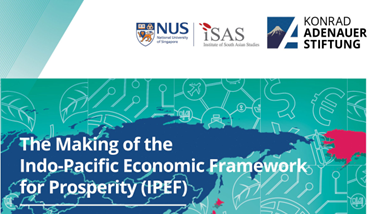The EU, the Indo-Pacific and the US-led IPEF: Which Way Forward?

The paper provides a European Union (EU) perspective on the Indo-Pacific Economic Framework (IPEF).
First, the recent progress made by the IPEF has given new momentum to the EU’s engagement with the Indo-Pacific (IP) partners and to its recently launched Indo-Pacific strategy.
In terms of substance, two issues appear to be at the forefront of the IPEF as well as of the EU’s Indo-Pacific strategy, namely supply chain resilience enhancement and various aspects of the digital economy.
There is probably scope for convergence and cooperation between the EU and the IPEF countries on the former issue, which is addressed indirectly in different EU’s digital partnerships, while it is the area where the IPEF has made most substantial progress.
However, the differences between the EU’s and the United States’ (US) approaches to some aspects of the digital economy may act as stumbling blocks and give rise potentially to some form of competition in the IP region, making cooperation on data-based efforts to enhance supply-chain resilience rather complicated.
> Read the whole chapter on the website of the Konrad Adenauer Shiftung.

Available in:
Regions and themes
Share
Related centers and programs
Discover our other research centers and programsFind out more
Discover all our analysesJapan’s Takaichi Landslide: A New Face of Power
Prime Minister Sanae Takaichi has turned her exceptional popularity into a historic political victory. The snap elections of February 8 delivered an overwhelming majority for the Liberal Democratic Party (LDP), driven by strong support from young voters, drawn to her iconoclastic and dynamic image, and from conservative voters reassured by her vision of national assertiveness. This popularity lays the foundation for an ambitious strategy on both the domestic and international fronts.
The U.S. Policy Toward Taiwan Beyond Donald Trump: Mapping the American Stakeholders of U.S.-Taiwan Relations
Donald Trump’s return to the White House reintroduced acute uncertainty into the security commitment of the United States (U.S.) to Taiwan. Unlike President Joe Biden, who repeatedly stated the determination to defend Taiwan, President Trump refrains from commenting on the hypothetical U.S. response in the context of a cross-Strait crisis.

China’s Strategy Toward Pacific Island countries: Countering Taiwan and Western Influence
Over the past decade, China has deployed a diplomatic strategy toward the Pacific Island Countries (PICs). This strategy pursues two main objectives: countering Taiwan's diplomatic influence in the region and countering the influence of liberal democracies in what Beijing refers to as the "Global South."

Opening up the G7 to South Korea to Address Contemporary Global Challenges
The G7’s global influence has diminished as powers like China reshape international governance through initiatives such as BRICS and the Shanghai Cooperation Organisation (SCO). With the G7 now representing just 10 per cent of the world’s population and 28 per cent of global GDP, its relevance is increasingly questioned.










